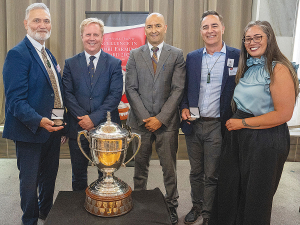NZ and Chile Sign New Agricultural Cooperation Deal
New Zealand and Chile have signed a new arrangement designed to boost agricultural cooperation and drive sector success.
 From left, Lester White, chair Tawapata South Maori Incorporation Onenui Station, Todd McClay Minister of Agriculture, Tama Potaka, Minister of Maori Development, Morris Pita and Huhana Lydon, co-chairs Whangaroa Ngaiotonga Trust. Photo Credit: Alpha Pix
From left, Lester White, chair Tawapata South Maori Incorporation Onenui Station, Todd McClay Minister of Agriculture, Tama Potaka, Minister of Maori Development, Morris Pita and Huhana Lydon, co-chairs Whangaroa Ngaiotonga Trust. Photo Credit: Alpha Pix
Farms from Northland and northern Hawke's Bay are the finalists in this year's Ahuwhenua Trophy competition for the top Māori sheep and beef farms.
The two finalists are Whangaroa Ngaiotonga Trust from Northland and Tawapata South Māori Incorporation Onenui Station from Hawke's Bay.
The finalists were announced by the Minister of Agriculture, Todd McClay, at a function in Parliament's Beehive last week. The event was attended by more than 100 people including politicians, diplomats, Māori and primary industry leaders, the finalists and their whanau.
The Ahuwhenua Trophy is an annual award for Māori agriculture and was inaugurated in 1933 by the Māori leader, Sir Apirana Ngata and the Governor General at the time, Lord Bledisloe. The objective was and still is to encourage Māori farmers to improve their land and their overall farming performance, with an emphasis on sustainability.
On a three-year roatational basis, the trophy is competed for by Māori farmers and growers in the sheep and beef, dairy and horticultural sectors. This year the competition is for sheep and beef.
Whangaroa Ngaiotonga Trusts property is situated near the east coast settlement of Whangaruru, about an hour's drive north of Whangārei. About an hour's drive further north is the popular tourist town of Paihia. The actual farms takes up about a third of the 1,100ha of land owned by the trust and on it they finish about 1,000 bulls. There is also 297ha of forestry and 433ha of native forest and wetland.
Tawapata South Māori Incorporation Onenui Station is a Māori incorporation located at the tip of the Māhia Peninsula, Hawke's Bay. Of the 3,476ha of whenua 1,700ha is effective farmland and 836ha under a Ngā Whenua Rāhui Kawenata.
Onenui Station is a sheep and beef farming unit wintering 15,000 stock units, including 6,000 breeding ewes, 600 breeding cows, replacements, and trade cattle. The farm finishes 75% of its sheep and 36% of its cattle, with the remainder sold store. The station comprises 350 hectares of productive flats, with the balance classified as North Island steep hard hill country.
Māori Agri Power
Nukuhia Hadfield, chair of the Ahuwhenua Trophy management committee, says it is fantastic to see these excellent finalists who will add to the impressive alumni created by this award.
She says the last few years have been hard for all sheep and beef farmers around the country as they have fought to stay in business against the odds of adverse weather and lower prices, especially for sheep meat.
"Māori farmers have been among the worst affected by the adverse weather, given that many are in areas such as the East Coast of the North Island which bore the brunt of Cyclone Gabrielle and other heavy rainstorms. I live in this region and know first-hand what our communities have endured," she says.
Hadfield says Māori are intergenerational farmers, meaning that while they want to get their properties up and running as quickly as others, they are equally concerned that any such repairs will be of such good quality as to protect the land for future generations.
"A philosophy that is both practical and sensible, and one that is catching on in the wider agri-sector," she says.
Hadfield says the other encouraging news for Māori was contained in a recent MPI report which shows that the asset base of Māori collectives (trusts, incorporations and other entities but not individual farmers) has risen from $6 billion in 2013 to $19 billion in 2023. She says this data shows conclusively that Māori are a real force in the NZ economy.
Castle Ridge Station has been named the Regional Supreme Winner at the Canterbury Ballance Farm Environment Awards.
The South Island Dairy Event has announced Jessica Findlay as the recipient of the BrightSIDE Scholarship Programme, recognising her commitment to furthering her education and future career in the New Zealand dairy industry.
New Zealand and Chile have signed a new arrangement designed to boost agricultural cooperation and drive sector success.
New DairyNZ research will help farmers mitigate the impacts of heat stress on herds in high-risk regions of the country.
Budou are being picked now in Bridge Pā, the most intense and exciting time of the year for the Greencollar team – and the harvest of the finest eating grapes is weeks earlier than expected.
The Real Estate Institute of New Zealand (REINZ) has released its latest rural property report, providing a detailed view of New Zealand’s rural real estate market for the 12 months ending December 2025.

OPINION: A mate of yours truly reckons rural Manawatu families are the latest to suffer under what he calls the…
OPINION: If old Winston Peters thinks building trade relations with new nations, such as India, isn't a necessary investment in…